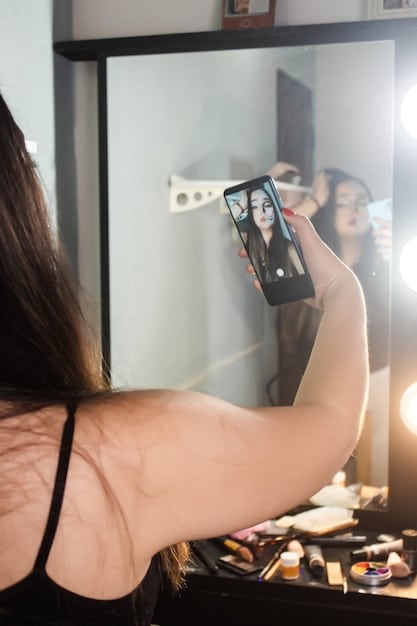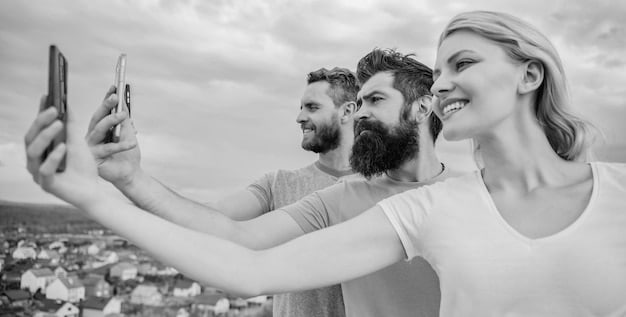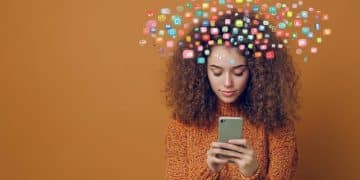Social Media & Body Image: Perfection’s Unrealistic Standards

Social Media’s Impact on Body Image: Unrealistic Standards and the Pursuit of Perfection explores how platforms like Instagram and TikTok contribute to body dissatisfaction by promoting unattainable ideals, triggering comparisons, and influencing perceptions of self-worth.
Have you ever scrolled through your social media feed and felt a pang of inadequacy about your own body? You’re not alone. Social Media’s Impact on Body Image: Unrealistic Standards and the Pursuit of Perfection is a growing concern in our digitally driven world.
Social Media’s Grip on Body Image: An Introduction
Social media has become an integral part of our daily lives, connecting us with friends, family, and the world at large. However, lurking beneath the surface of curated content and filtered photos lies a darker side: its profound influence on our body image.
The constant exposure to seemingly perfect bodies and lifestyles online can fuel a dangerous cycle of comparison and self-doubt, leading many individuals to question their own worth and appearance.
The Prevalence of Unrealistic Standards
Social media platforms are awash with images and videos that often present unrealistic standards of beauty. These standards are meticulously crafted through filters, editing, and strategic posing, creating an illusion of perfection that is often unattainable in real life.
- The use of filters and editing tools to alter physical appearance.
- The promotion of specific body types and aesthetics as ideal.
- The influence of celebrity culture and influencer marketing.
These factors contribute to a distorted perception of what is considered “normal” or “attractive,” setting unrealistic expectations for individuals and perpetuating harmful body image ideals.
The Psychology Behind Social Media’s Impact
Understanding the psychological processes at play is crucial to grasping the full extent of social media’s impact on body image. Various psychological theories offer insights into how social comparison, self-perception, and media influence contribute to body dissatisfaction.
By understanding the psychological underpinnings of this phenomenon, we can better address its root causes and promote healthier attitudes towards body image.

Social Comparison Theory
Leon Festinger’s Social Comparison Theory posits that individuals have an innate drive to evaluate themselves by comparing themselves to others. In the context of social media, this often leads to upward comparisons, where individuals compare themselves to those they perceive as superior in terms of physical attractiveness or social status.
This upward comparison can lead to feelings of envy, inadequacy, and body dissatisfaction, as individuals internalize unrealistic standards and strive to emulate them.
Self-Perception and Media Influence
Media influence plays a significant role in shaping self-perception and body image. The constant exposure to idealized images in media can lead individuals to internalize these standards as their own, resulting in a discrepancy between their perceived self and their ideal self.
- The impact of media on shaping beauty standards.
- The internalization of unrealistic ideals.
- The discrepancy between perceived self and ideal self.
This discrepancy can lead to negative self-evaluations, body dissatisfaction, and even mental health issues such as anxiety and depression.
Ultimately, understanding the psychological aspects helps to explain how easy it is for social media to affect the way users see themselves.
The Role of Algorithms and Curated Content
Social media algorithms and curated content play a significant role in shaping the types of images and messages individuals are exposed to online. These algorithms are designed to maximize user engagement, often prioritizing content that is sensational, provocative, or aligned with an individual’s existing preferences.
This creates a feedback loop where individuals are constantly bombarded with content that reinforces unrealistic beauty standards, further exacerbating body image concerns.

Filter Bubbles and Echo Chambers
The algorithmic nature of social media can lead to the creation of filter bubbles and echo chambers, where individuals are primarily exposed to content that confirms their existing beliefs and preferences. This can limit exposure to diverse perspectives and reinforce narrow, unrealistic beauty ideals.
For example, an individual who consistently engages with fitness-related content may be shown an increasing number of images of toned bodies and workout routines, creating a skewed perception of what is achievable or desirable.
The Problem with Curated Perfection
Curated content on social media is often carefully crafted to present an idealized version of reality. Individuals selectively share their best moments, filter their photos, and edit their videos to create a polished and seemingly perfect online persona.
- The selective sharing of positive experiences and images.
- The use of filters and editing to enhance appearance.
- The presentation of an idealized online persona.
This curated perfection can be detrimental to body image, as viewers are presented with a distorted view of reality that is often unattainable and unsustainable.
These filter bubbles of carefully selected content can amplify anxiety and issues for everyday social media users.
The Negative Consequences: Mental Health and Beyond
The impact of social media on body image can have far-reaching consequences for mental health and overall well-being. The constant exposure to unrealistic standards and the pressure to conform can lead to a range of negative outcomes.
Recognizing these consequences is essential for promoting healthier online habits and seeking support when needed.
- Increased rates of anxiety and depression.
- The development of eating disorders and body dysmorphia.
- Lowered self-esteem and self-confidence.
Body Dysmorphia and Disordered Eating
Body dysmorphia is a mental health condition characterized by an obsessive preoccupation with perceived flaws in one’s appearance. Social media can exacerbate body dysmorphia symptoms by providing a constant stream of images to fuel self-criticism and comparison.
Similarly, social media can contribute to disordered eating behaviors such as restrictive dieting, excessive exercise, and binge eating, as individuals strive to achieve unrealistic body ideals.
The Impact on Self-Esteem and Confidence
The constant comparison and self-evaluation that occurs on social media can erode self-esteem and self-confidence. Individuals who feel they do not measure up to online standards may experience feelings of shame, inadequacy, and worthlessness.
This can have a ripple effect on various aspects of life, affecting relationships, academic or professional performance, and overall quality of life.
These are all key indicators of the widespread damage that unrealistic standards on social media can bring.
Strategies for Cultivating a Healthy Body Image
While social media can pose challenges to body image, it is possible to cultivate a healthier relationship with online platforms and promote more positive self-perceptions. Various strategies can help individuals navigate social media in a way that supports their mental well-being.
By implementing these strategies, individuals can reclaim their body image and foster a more positive and self-affirming online experience.
Curate Your Feed
Take control of the content you consume by curating your social media feed. Unfollow accounts that promote unrealistic beauty standards, trigger negative emotions, or make you feel inadequate. Seek out accounts that promote body positivity, diversity, and self-acceptance.
Intentional curation can transform your social feed into a space that nourishes self-esteem rather than depleting it. Actively look for users and influencers that promote a positive environment.
Practice Mindful Social Media Consumption
Engage with social media mindfully, paying attention to how it makes you feel. Be aware of the triggers that lead to negative self-comparisons or feelings of inadequacy. Limit screen time and take breaks from social media when needed.
- Limit screen time and set boundaries.
- Be mindful of triggers and emotional responses.
- Practice self-compassion and challenge negative thoughts.
Remember to take breaks and be kind to yourself, challenging any negative thoughts that surface. This can help create a safer online environment for your mental health.
Promoting Body Positivity and Inclusivity Online
Creating a more body-positive and inclusive online environment requires collective effort. Individuals, influencers, and social media platforms all have a role to play in promoting diversity, challenging unrealistic standards, and fostering a culture of acceptance and self-love.
This way, we might be able to shift culture towards being safe and accepting of everyone and their bodies.
The Role of Influencers and Content Creators
Influencers and content creators have a significant influence on their followers’ perceptions of beauty and body image. By promoting realistic representations of bodies, challenging unrealistic standards, and advocating for body positivity, influencers can positively impact their audience.
This shift towards authenticity can help normalize diverse body types and promote a more inclusive definition of beauty.
Platform Responsibility
Social media platforms have a responsibility to address the harmful effects of their algorithms and content moderation policies on body image. Implementing measures to reduce the proliferation of unrealistic beauty standards and promote diverse representations of bodies can help create a safer and more supportive online environment. This is particularly true when considering the potential impact on younger audiences.
- Algorithm transparency and bias reduction.
- Content moderation policies that address harmful content.
- Promoting diverse representations of bodies.
A culture where people are happy with themselves is within reach if everyone does their part.
| Key Point | Brief Description |
|---|---|
| 📸 Unrealistic Standards | Social media promotes edited and filtered images, setting unattainable beauty ideals. |
| 🧠 Psychological Impact | Constant comparison leads to lower self-esteem and body dissatisfaction. |
| 🛡️ Strategies | Curate your feed, practice mindfulness, and promote body positivity online. |
| 🌐 Inclusivity | Influencers and platforms should promote realistic representations and challenge harmful content. |
Frequently Asked Questions
▼
Social media often presents unrealistic beauty standards through filters, editing, and curated content. This constant exposure can lead to negative self-comparisons and feelings of inadequacy about one’s own body.
▼
Psychologically, social media can cause anxiety, depression, and body dysmorphia. The pressure to meet unrealistic standards erodes self-esteem and triggers constant self-evaluation, leading to mental health issues.
▼
Algorithms curate content that reinforces existing preferences, leading to filter bubbles. This constant exposure to similar, often unrealistic, images intensifies body image concerns and limits exposure to diverse perspectives.
▼
Yes, social media can promote body positivity by curating your feed to include diverse and realistic representations of bodies. Following influencers who advocate self-acceptance can foster a healthier online experience.
▼
Platforms should implement transparent algorithms, moderate harmful content, and promote diverse representations of bodies. This includes reducing the proliferation of unrealistic beauty standards and creating a supportive online environment.
Conclusion
Ultimately, social media’s impact on body image is a complex issue that requires conscious effort to navigate. By understanding the psychological mechanisms at play, curating our online experiences, and advocating for body positivity, we can mitigate the negative effects and foster a healthier relationship with both ourselves and social media.





